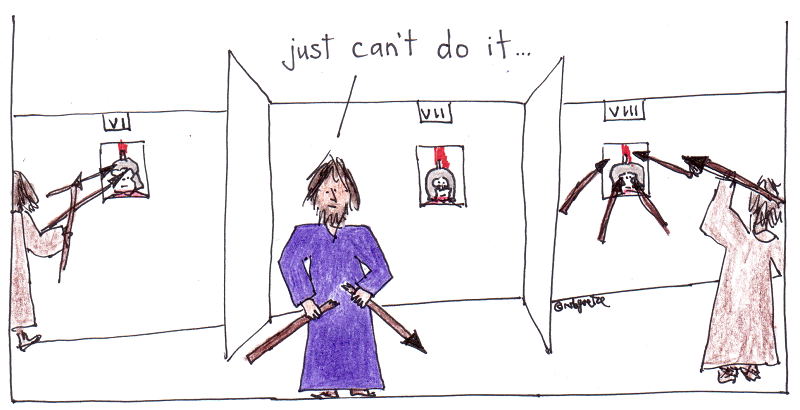Can you
imagine Jesus throwing spears at soldiers of the occupying Roman army? Or even at the pictures of faces of soldiers, for practice?
I can't. Would Jesus be acclaimed as the leader of the Jewish resistance movement? Certainly some of his people were hoping he'd be that kind of Messiah, but that's not who he is nor what he came to do.
Instead, he willingly gave up his life to show us that violence is not the way to go.
And in the world late last week, outrage on Twitter at news of a South Florida police department using
mugshots of black people for target practice. How's that for
continued dehumanization of black people?
Granted these men were charged with crimes. That doesn't change the fact that
they are human beings, with mothers, fathers, brothers, sisters, other family members and friends. They are men created by the God of the universe, and no matter what, some glimpse of his image remains. Jesus loves them and gave his life for them.
And in very related news,
the BBC reports that Sgt. Deant, a soldier in the National Guard was shocked when
she saw her own brother's face as one of the target images at the North Miami Beach Police firing range which she was using after a training session.
The photo of her brother Woody Deant had been taken after his arrest as a teenager for drag racing. It had been shot several times.
Mr Deant said he was "speechless" when he heard the news.
"Now I'm being used as a target? I'm not even living that life according to how they portrayed me as. I'm a father. I'm a husband. I'm a career man. I work nine to five."
The first shall be last and the last shall be first.
And for a small glimmer of solidarity from WP:
Reminds me slightly of the Catholic priest Maximilian Kolbe who at Auschwitz took the place of a man who was going to be killed by starvation.












![the table I long for ..is one where all are... desperately & fiercely wanted. Quote by Jeff Chu at GCN Conference 2015] the table I long for ..is one where all are... desperately & fiercely wanted. Quote by Jeff Chu at GCN Conference 2015]](https://blogger.googleusercontent.com/img/b/R29vZ2xl/AVvXsEh0ZLY8IYRd1qHVxR6o2jqIU3KfY7Ebtpn1Mkt95I5dFPhdTPf_hAMZFoDVtKlypQhuB9SXmcRsmpR_SKy8dYWQdY8I1j8-WZ09s5ilwOPOAzRzrfOuD9dANkudQufWBXP3KBl-jrjr8rV9/s1600/TheTableILongFor-JeffChu-GCN2015.png)
